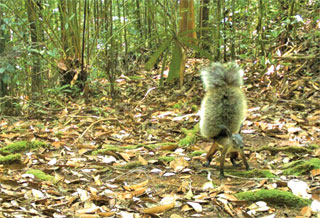News around the
world
The right way to treat a cold
What do your parents give you when you catch a cold? The odds are
that whatever it is, it has a large amount of vitamin C in it, which,
according to a new study in the Canadian Medical Association Journal,
does absolutely nothing to cure colds!

The common cold is called common for a reason- adults get about two
or three a year, children get about six, and the elderly get about one.
It causes children to miss school and adults have to take days off to
stay home with them or recover themselves.
If a child gets sick, a parent will usually take a day off to stay
home with them. All of these sick days can add up, affecting children's
education if they miss too many days and costing an adult's company a
lot of money.
The most popular way of treating the common cold has been to eat and
drink food or vitamins high in vitamin C, such as orange juice,
strawberries, and broccoli. Some people buy over-the-counter medication
to relieve their symptoms. Some even flush their noses with a special
mucous-dissolving solution, eat garlic, take spoonfuls of certain oils,
make special teas or try other unusual solutions.
According to the study, all of those treatments have little to no
effect on killing colds. Vitamin C may be helpful for sick people who
are, for example, running a marathon or live in a cold Arctic climate;
but 29 trials with more than 11,300 people proved that it gave "no
meaningful benefit in the average patient."
Antibiotics also proved to do more harm than good in treating common
colds because most are caused by a virus, which can't be treated with
antibiotics. While antibiotics can be life-saving they can also become
dangerous if taken too often because our bodies build up a resistance to
them, so they should never be taken for a small cold.
Zinc proved to make colds disappear about 1.5 days sooner in adults,
but did almost nothing for kids who took it once they were already sick.
However, if taken year-round, zinc may help reduce the number of
colds children catch per year, but more research is needed to prove
that.
Honey proved to be the most effective way to help children and adults
with a cough sleep better at night. Just a spoonful before bed helped
children and their parents sleep better. The simple way to prevent
catching or spreading colds is the old fashioned hand washing and using
hand sanitizer!
Internet
"Goldfish Memory", a fact
 Having the memory of a goldfish may not actually be a bad thing,
according to a three-day study that proved fish can remember events from
12 days before. Having the memory of a goldfish may not actually be a bad thing,
according to a three-day study that proved fish can remember events from
12 days before.
Scientists tested the memory of African Cichlids, a freshwater fish,
to see if they could train them to return to a place where they had
found food nearly two weeks earlier.
Over three days they taught them to enter a specific zone of their
aquarium to be fed. After 12 days the fish were reintroduced into that
same tank to see if they could remember to go to the same area to be
fed.
Lo and behold, they did, proving that their memory lasts much longer
than a couple of seconds. Scientists believe this is because they
associate locations with their preferred source of food.
"Fish that remember where food is located have an evolutionary
advantage over those that do not. If they are able to remember that a
certain area contains food without the threat of a predator, they will
be able to go back to that area.
Internet
Meet the squirrel with the world's bushiest tail

This squirrel is the owner of the world's fluffiest tail, but you
should think twice before cuddling it. Rheithrosciurus macrotis, also
known as the "vampire squirrel," lives on the island of Borneo in
Southeast Asia. It is twice the size of average squirrels at 14 inches
long, and has rarely seen in person.
Its tail is 130 per cent the size of its body. To compare, the giant
ant eater's tail is 80 per cent of its body size, making it a close
second for the title.
The vampire squirrel earned its nickname from local legends that say
the squirrel will sit on low branches and jump on to a deer, bite its
neck and kill it and eat it as a tasty meal. However, this has never
been witnessed and there is no documented proof.
"(The legend) sounds pretty fantastical," said Roland Kays, a
zoologist at the North Carolina Museum of Natural Sciences in Raleigh.
"Even more than its fluffy tail!"
The vampire squirrel also has particularly furry ears that stick up!
It's not known why the squirrel needs such a bushy tail, but Erik and
Rona as well as their 15-year-old Emily Mae Meijard believe it may be to
confuse predators and prevent them from getting a good grasp on the
squirrel.
- Internet |

